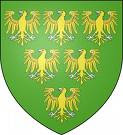Edward II and Piers Gaveston
Piers Gaveston is one of the most notorious 'favourites' in English history. He was the beloved of King Edward II, who reigned from 1307 to 1327, and is still well-known today thanks to many productions of Christopher Marlowe's play about Edward and the Oxford University society which bears his name.
Piers came from Béarn, an area of Gascony in south-western France then ruled by the English crown. His family took its name from the village of Gabaston close to the town of Pau and the Pyrenees. Piers was the second child and second son of Sir Arnaud de Gabaston and Claramonde de Marsan, and, far from being the lowborn nobody he's often been made out to be in the last 700 years, was the grandson of two of the leading barons of Béarn. He was probably named after his uncle Piers or Pierre Caillau, mayor of Bordeaux, who married Miramonde de Marsan, sister of Piers' mother Claramonde. Piers' date of birth is unknown: his parents married sometime before 30 June 1272, and his younger sister Amie, the fifth child of his parents, was born in 1285. Edward II was born on 25 April 1284 and Piers was described as his 'contemporary', so was perhaps born in the late 1270s or early 1280s. He first appears on record in November 1297, when he and his father had moved to England and Piers had become a squire of Edward I's household. At an unknown date perhaps in 1300, Edward I placed Piers in the household of his sixteen-year-old son and heir Edward of Caernarfon, the future Edward II. It was a fateful decision.
One chronicler says that when Edward of Caernarfon first saw Piers, "he fell so much in love that he entered upon an enduring compact with him, and determined to knit an indissoluble bond of affection with him, above all other mortals." A clerk of Edward's court who wrote a biography of him remarked "I do not remember to have heard that one man so loved another. Jonathan cherished David, Achilles loved Patroclus. But we do not read that they were immoderate. Our king, however, was incapable of moderate favour." That Edward II adored Piers Gaveston is absolutely beyond doubt. He made him earl of Cornwall in 1307, arranged his marriage to his (Edward's) thirteen-year-old niece Margaret de Clare a few months later, and demonstrated time and again that he was unable to live without Piers: Edward's father and his barons exiled Piers from England no fewer than three times, and Edward brought him back every time. The king's obsession with and excessive favour towards Piers brought England to the brink of civil war in 1308, and most of Edward's magnates united against him and his beloved friend (or lover). Edward's popularity plummeted, but he seemed to care nothing for this or for the opposition to himself and Piers. In 1308/09, he worked tirelessly to bring Piers back to England from his second exile, using a policy of 'divide and conquer' among his barons and even manipulating Pope Clement V to his side, and this paid off when Piers returned in 1309, having done a pretty impressive job as lord lieutenant of Ireland in the meantime.
Unfortunately Piers and Edward had little political sense and soon proved they had learnt nothing from Piers' year-long enforced exile. Piers gave the English magnates insulting nicknames and behaved towards them with a "superciliousness which would be unbearable enough in a king's son," and aggravated beyond endurance, Edward's magnates exiled Piers for a third time in late 1311. Unable to live without him, Edward II defiantly recalled him within two and a half months and restored him yet again to the earldom of Cornwall in January 1312. King and earl fled to the north of England, out of the way of the enraged magnates, but Piers was captured in June 1312 by the earl of Warwick, whom he had taunted as 'the black dog of Arden'. The earls of Lancaster, Hereford and Arundel arrived at Warwick Castle and condemned Piers to death, and he was run through with a sword and beheaded at Blacklow Hill near Warwick on 19 June 1312. Edward II's reaction to Piers' murder was utter rage, and that he grieved for him deeply and sincerely is obvious. For the rest of his reign, until 1326, Edward remembered Piers often in prayers and took care of his mortal remains, which he buried at Langley Priory in Hertfordshire, his own foundation. Piers left a daughter, Joan, Edward II's great-niece, who sadly died when she was thirteen, and an illegitimate daughter, Amie.
Kathryn Warner’s new book, ‘Edward II: The Unconventional King’,
is available to buy now at the Amberley website: www.amberleybooks.com.
Visit Kathryn’s blog here: http://edwardthesecond.blogspot.co.uk/





6 comments:
Thanks for hosting me, Anerje, and hope you enjoyed the post! :-)
You're most welcome! Been waiting for a book like this! And I loved the post!
It's the irony of history that Piers, who was competent in his positions, favourite or not, met such an end while Hugh got way too much influence on Edward. What if the barons had managed to kill him ....
Well Gabriele, if only they'd never murdered Piers - Despencer would never have risen to power. Who knows, maybe Edward would not have been overthrown.
Had only Edward and Piers been a little bit more patient... and that dukedom of Cornwall. It must have been the proverbial last straw, I guess.
Anyway, great post, all the info neatly put together- as always. Thank you, Kathryn and Anerje.
I meant earldom of Cornwall, of course :-)
Post a Comment